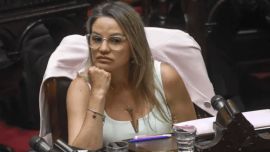Politics has returned among the pandemic. The Madrid libertarian document signed by former president Mauricio Macri, among others, expressing fears of the coronavirus pandemic becoming a Trojan horse for authoritarianism joins a growing concern about the future of institutions at various levels – the questions raised are absolutely valid, although the answers are another story. The signatories of the Madrid document point their fingers firmly in one direction while their opposite numbers, in groupings like Grupo de Puebla, point their fingers back. But the problems posed by this pandemic go beyond right versus left or even authoritarianism versus democracy.
In the first place the accusation of “authoritarian” does not stick easily in an extreme situation calling for extreme measures where inaction is not an option. The preventive measures against the pandemic have trampled on rights and freedoms of almost every kind (although freedom of opinion mercifully continues), while leaving those deprived of a birthright helpless to protest when governments are forced to make cruel choices between thousands dead, millions impoverished and billions of dollars lost. Just to give one example, banning church services would qualify as religious persecution in any other context yet such measures have passed almost unnoticed amid the pandemic. Fundamental rights have been wiped out almost overnight by a massive invasion of state power and yet the sensation is more of a slow drip than sudden shock.
Secondly, the distinction between authoritarian and libertarian is more blurred than the authors of the Madrid document seem to think. They largely limit the charge of authoritarianism to those governments imposing a blanket quarantine, which is interpreted as the perfect cover under which to usurp absolute power. Yet many of the leaders resisting lockdown are proving to be more authoritarian than the so-called authoritarians – the anti-system thrust of presidents like Donald Trump in the United States and Jair Bolsonaro in Brazil was already corrosive for the institutions before the pandemic, but has been aggravated by the crisis with their chaotic unpredictability another form of tyranny. When Trump openly calls for civil disobedience in Michigan against its state government, he is turning the distinction between dictatorship and anarchy into an extremely fine line, bringing liberal democracy into disrepute in the world’s leading exponent of those values.
Yet these flaws in the self-styled libertarian paragons should not mean that those governments imposing lockdown and far less the genuine authoritarians in the world should be exempt from scrutiny. Those who feel that an authoritarian dictatorship is the best alternative to control the pandemic should never forget that this all started in China – its totalitarian regime nevertheless failed to control the epidemiological time-bombs of the Wuhan markets with the limits on information of a repressive system compounding the disaster.
Yet this is an Argentine newspaper so we will leave China, the US, Brazil, etc. aside and stay at home (as we all are) for the rest of this editorial. All the initiatives of President Alberto Fernández thus far have come after careful consultation with the best medical experts. This has won him a deserved and necessary popularity as the country rallies around its leader in a crisis, giving him a focus which his complex coalition government had previously lacked. Government supporters are naturally relieved that a faction-ridden administration failing to end an economic recession is having such a comfortable ride in the opinion polls, but many opposition voters should arguably even more content because the surge in presidential authority has put a lid on his government’s more extremist wing for now, hence the high percentages.
Yet doubts are now starting to move towards Fernández himself. This week’s clumsy attempt to grant house arrest to former transport secretary Ricardo Jaime (convicted for corruption under the Cristina Fernández de Kirchner presidency and thus not a political prisoner by any stretch of the imagination) have aroused suspicions that he is not so much using the pandemic to cover a seizure of absolute power as the far more sordid mission of solving the legal problems of those Kirchnerites accused of corruption. The Justice and Human Rights Ministry countered that it supported only the petition for house arrest and passed no judgement on Jaime’s guilt or innocence.
As default looms, there also arises the suspicion that Fernández has gone out of his way to maximise quarantine in order to minimise the offer to creditors. The next focus of immediate attention, as well as debt talks, will be Congress, which will be getting back to action sooner or later, in person or online, with a wealth tax on the table.
There remains a nagging question. One day the pandemic will end but when it does, will the emergency powers so necessary to fight it go tamely back into the bottle?



















Comments